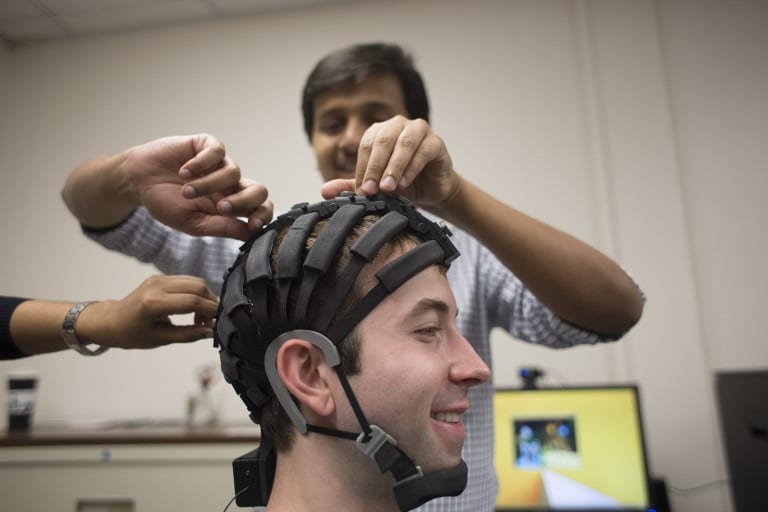
A researcher at Missouri University of Science and Technology wants to scrap the traditional electronic and paper survey approach to gathering marketing and information systems data in favor of scanning your brainwaves. Dr. Keng Siau, professor and chair of the business and information technology department, is looking at using an electroencephalogram (EEG) headset to pick your brain.
An EEG tracks and records brain wave patterns. Small metal discs with thin wires (electrodes) are placed on the scalp, and then send signals to a computer to record the results.
“We’re actually trying to go deeper inside,” Siau says. “Because when you ask someone to fill out a questionnaire, there are a few issues.”
Chief among them are time and accuracy.
“I receive a lot of questionnaires. But do I have time to fill them out? Most of the time, I don’t. I just put them aside,” says Siau.
He uses the common problem of getting accurate survey responses as an example.
“A lot of times, we want to get information from CEOs, but CEOs don’t have the time and just pass it to their secretaries. The secretaries are the ones that fill out the questionnaires, not the CEOs. A secretary’s opinion will be somewhat different from the opinion of a CEO.”
Siau also says that people often answer survey questions based on what they think the surveyor wants to hear.
“‘This is what I think, but this is what they want. OK, I’ll give them what they want’,” he says. “When I look at something, maybe I have a first response. But then I think maybe people want to hear this answer and not that one.”
When an individual’s brain activity is monitored, however, “it’s harder to lie, it’s more instantaneous and unfiltered,” Siau adds.
Cognitive neuroscience is an emerging field in information systems and marketing research. Siau and his former research assistant, Yeli Zhao, who recently graduated with an MBA and is now working at the Chinese University of Petroleum in Beijing, reviewed several neurophysiological tools used in this field. Their review included the EGG, as well as functional MRI (fMRI), positron emission tomography (PET) and magnetoencephalography (MEG). They outlined the strengths and weaknesses of each tool and highlighted future research directions in cognitive neuroscience in their review article “Cognitive Neuroscience in Information Systems Research,” published in the January 2016 edition of the Journal of Database Management.
As expected, Siau and Zhao found a strong correlation between cost and effectiveness among the tools. For example, an EEG headset can only scan the surface of the brain, while a functional MRI can penetrate deeper into the brain to retrieve thoughts and emotions. But at $50,000, the cost of a good quality EEG headset is relatively cheap compared to a state-of-the-art MRI scanner, which goes for about $2 million to $3 million.
Siau called the comparative and review research “a starting point.”
“It’s a new way of thinking about and researching previous research questions,” he says. “We have been using surveys as a technique for data collection. Now we have a new technique called cognitive neuroscience that will look at brain activity.
“It opens up new dimensions to study cognition in information systems research,” he adds.
Learn more: Missouri S&T researcher wants to electronically pick your brain
[osd_subscribe categories=’cognitive-neuroscience’ placeholder=’Email Address’ button_text=’Subscribe Now for any new posts on the topic “COGNITIVE NEUROSCIENCE”‘]
Receive an email update when we add a new COGNITIVE NEUROSCIENCE article.
The Latest on: Cognitive neuroscience
[google_news title=”” keyword=”cognitive neuroscience” num_posts=”10″ blurb_length=”0″ show_thumb=”left”]
via Google News
The Latest on: Cognitive neuroscience
- Owen Dahlkampon May 1, 2024 at 11:47 am
Owen Dahlkamp is a 2024 Puffin student writing fellow for The Nation. He is a journalist at Brown University where he is pursuing a degree in political ...
- PEN student wins NSF graduate research...on May 1, 2024 at 8:50 am
Graduate student Christina Kim is among the winners of the 2024 National Science Foundation (NSF) Graduate Research Fellowship Program (GRFP) awards. Kim, a second year student in the Ph.D. Program in ...
- The interplay of cognitive and motor skills of piano playing may help the brain stay youngon April 30, 2024 at 2:07 am
When it comes to amateur music enthusiasts playing an instrument, the piano is among the most popular. And this isn’t surprising, since playing the ...
- Neuroscience Says Rituals Rewire Your Brain to Better Face Failureon April 30, 2024 at 12:55 am
Neuroscientific studies have shed light on how rituals affect the brain's response to failure, particularly through the lens of neural performance monitoring. The error-related negativity (ERN), a ...
- Video Chats Improve Cognitive Function in Older Adultson April 29, 2024 at 2:10 pm
Video chats can significantly improve cognitive function among socially-isolated older adults. The corresponding study was published in The | Neuroscience ...
- Global Cognitive Neuroscience Market is expected to develop at a 4.6% CAGR in 2021–2031on April 26, 2024 at 6:26 am
Cognitive Neuroscience Market is set to witness a 4.6% CAGR growth during the year 2021 to 2031. Europe is the second leading market ...
- High Dose of Creatine Boosts Cognitive Performanceon April 25, 2024 at 8:27 am
Researchers at Forschungszentrum Jülich have now discovered in a scientific study that a high single dose of creatine can temporarily improve cognitive performance that is reduced by sleep deprivation ...
- Neuroscience Says Embracing This Mindset Actually Changes How Your Brain Is Wired (in the Best Possible Way)on April 22, 2024 at 3:58 am
A study published in Psychological Science found that people with a growth mindset exhibit a higher Pe (error positivity) waveform response, which correlates to paying greater attention to mistakes -- ...
- Untangling dreams and our waking lives: Latest findings in cognitive neuroscienceon April 14, 2024 at 10:30 am
Musings about dreams abound throughout society, from movies to TV to books. But despite being a constant source of fascination, the role of dreams in our lives still remains elusive.
via Bing News










